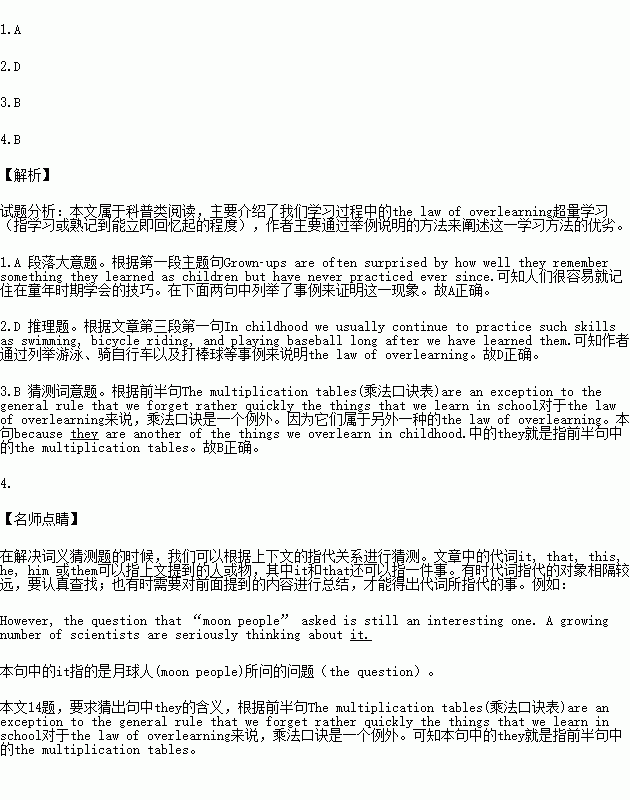题目内容
Grown?ups are often surprised by how well they remember something they learned as children but have never practiced ever since. A man who has not had a chance to go swimming for years can still swim as well as ever when he gets back in the water. He can get on a bicycle after many years and still ride away. He can play catch and hit a ball as well as his son. A mother who has not thought about the words for years can teach her daughter the poem that begins “Twinkle, twinkle, little star” or remember the story of Cinderella or Goldilocks and the Three Bears.
One explanation is the law of overlearning, which can be stated as follows: Once we have learned something, additional learning trials(尝试)increase the length of time we will remember it.
In childhood we usually continue to practice such skills as swimming, bicycle riding, and playing baseball long after we have learned them. We continue to listen to and remind ourselves of words such as “Twinkle, twinkle, little star” and childhood tales such as Cinderella and Goldilocks. We not only learn but overlearn.
The multiplication tables(乘法口诀表)are an exception to the general rule that we forget rather quickly the things that we learn in school, because they are another of the things we overlearn in childhood.
The law of overlearning explains why cramming(突击学习)for an examination, though it may result in a passing grade, is not a satisfactory way to learn a college course. By cramming, a student may learn the subject well enough to get by on the examination, but he is likely soon to forget almost everything he learned. A little overlearning, on the other hand, is really necessary for one's future development.
1.What is the main idea of Paragraph 1?
A.People remember well what they learned in childhood.
B.Children have a better memory than grown?ups.
C.Poem reading is a good way to learn words.
D.Stories for children arc easy to remember.
2.The author explains the law of overlearning by______.
A.presenting research findings
B.selling down general rules
C.making a comparison
D.using examples
3.What does the word “they” in Paragraph 4 refer to?
A.Commonly accepted rules.
B.The multiplication tables.
C.Things easily forgotten.
D.School subjects.
4.What is the author's opinion on cramming?
A.It leads to failure in college exams.
B.It's helpful only in a limited way.
C.It's possible to result in poor memory.
D.It increases students' learning interest.
 世纪百通期末金卷系列答案
世纪百通期末金卷系列答案


 Following the road and you will find the store.
Following the road and you will find the store.